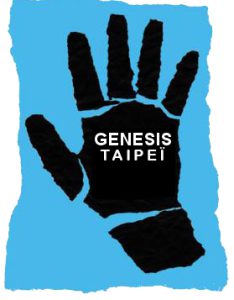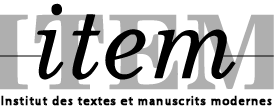07/06/2017 - 04/10/2025

The GENESIS CONFERENCES is a series of conferences dedicated to genetic criticism that are held regularly in different countries around the world. Each conference is organised by a prestigious local and international scientific committee. Participation is free for all scholars and students interested in the application of genetic criticism to literature, philosophy, or the arts.

« GENESIS – HELSINKI 2017: Creative Processes and Archives in Arts and Humanities », The Finnish Literature Society (SKS) and ITEM, Helsinki (Finland), 7th–9th of June 2017.
The conference is organised by the Finnish Literature Society – SKS (www.finlit.fi/en) and ITEM (www.item.ens.fr) in cooperation with several institutional partners: Ambassade de France en Finlande; Cardiff University; Centre for Manuscript Genetics, Antwerp; Finnish National Agency for Education; Huygens ING, Amsterdam; Jean Sibelius Works, Helsinki; Loughborough University; The National Library of Finland; The Swedish Cultural Foundation in Finland; Université Paris 3; University of Helsinki (Finnish Literature / Department of Finnish, Finno-Ugrian and Scandinavian Studies; French Philology / Department of Modern Languages), and University of Turku – School of Languages and Translation Studies.
The conference has been supported by The Federation of Finnish Learned Societies and Jenny and Antti Wihuri Foundation.
Organizing Committee
Hanna Karhu (University of Helsinki / Finnish Literature Society – SKS / ITEM), Sakari Katajamäki (Finnish Literature Society – SKS / Edith – Critical Editions of Finnish Literature), Christophe Leblay (University of Turku / ITEM), Veijo Pulkkinen (University of Helsinki), and Sakari Ylivuori (Jean Sibelius Works).
Programme of Genesis HELSINKI 2017

« GENESIS – CRACOW 2019. Genetic Criticism: from Theory to Practice », Faculty of Polish Studies at the Jagiellonian University and ITEM – Cracow (Poland), 12-14 June 2019.
The Cracow conference, like the Helsinki event, welcomes researchers interested in literature, theatre, music, painting and other fields of human activity in which the creative process is of central importance. Consequently, not only the outcome, but the process itself will be the focus of the conference. The binary subtitle of the event “From Theory to Practice” emphasizes the dual profile of the conference, which is meant to serve as a forum for discussion on both theoretical and practical aspects of genetic criticism. We welcome papers presenting broad theoretical perspectives and offering case studies of various texts and phenomena across time and space.
The conference participates in the framework of the International Research Network « Genetic Criticism and Digital Humanities » (DIGEN)
The participants included scholars from Finland, France, Austria, Belgium, England, Germany, Ireland, Italy, Lithuania, Netherlands, Poland, Russia, Tunisia, Turkey, Wales and Canada
Organizing Committee
Paolo D’Iorio (Director of ITEM), Catherine Rovera (Head of the Joyce Team at ITEM), Stanisław Jaworski (Professor Emeritus, Faculty of Polish Studies, Jagiellonian University), Anna Łebkowska (Vice-Dean of the Faculty of Polish Studies, Jagiellonian University), Jarosław Fazan (Vice-Dean of the Faculty of Polish Studies, Jagiellonian University), Dorota Jarząbek-Wasyl (Faculty of Polish Studies, Jagiellonian University), Mateusz Antoniuk (Faculty of Polish Studies, Jagiellonian University), Sakari Katajamäki (Edith – Critical Editions of Finnish Literature, Finnish Literature Society – SKS)
Programme of GENESIS CRACOW 2019

« GENESIS – OXFORD 2022. Creative Revision. Exercises in Comparative Genetic Criticism», Oxford (UK), 15-17 Mars 2022.
This conference is co-organised by the University of Oxford (Jesus College), the University of Antwerp (Centre for Manuscript Genetics) and ITEM.
The conference will be followed by the ESTS OXFORD 2022 conference (European Society for Textual Scholarship), 17-19 March 2022, and preceded by a pre-conference colloquium on authors’ libraries, 15 March 2022.
Academic Committee:
Mateusz Antoniuk, Olga Beloborodova, Nicholas Cronk, Paolo D’Iorio, Sakari Katajamäki, Seamus Perry, Adam Smyth, Kathryn Sutherland, Dirk Van Hulle, Wim Van Mierlo, Daniel Wakelin.
Organizing Committee: Mateusz Antoniuk, Olga Beloborodova, Sakari Katajamäki, Dirk Van Hulle
Programme of GENESIS OXFORD 2022

When Emily Dickinson happens to draft on the flap of an envelope or when Nabokov decides on the index card as his preferred tool, are the materials, the concrete vehicles of creativity merely accidental or are they substantive? Would Dickinson on any other paper be just as poetic? Or alternatively, a full stop will come to punctuate the endless reshuffling of the cards in Nabokov’s The Original of Laura only when we are able to name the game. If the environs do play a part in the creative event, what are the lines of demarcation between the event and its surrounding which will help confine our examination and its later or lateral representations, print or otherwise? On what basis can we say that the drafting is thrown into and liberated from the controlled chaos that is a writer’s desk, that the creative event is distributed across the entire workflow, or, in the end, the event can only be fully understood by resorting to a higher system?
We can think of the creative space on the model of the semiosphere as envisioned by Juri Lotman. Namely, without attending to and attempting to reconstruct the environ, i.e., the envelope instead of its flap, in which the individualized creative event finds itself, the latter cannot be fully understood: “all semiotic space may be regarded as a unified mechanism . . . In this case, primacy does not lie in one or another sign, but in the ‘greater system,’ namely the semiosphere. The semiosphere is that same semiotic space, outside of which semiosis itself cannot exist.”
In contrast, if we can look for inspiration in psychology, creativity resides neither in the inner psychic reality nor in the external reality. According to Winnicott, “play is in fact neither a matter of inner psychic reality nor a matter of external reality.” The place of creativity is “neither inside nor outside.” This space of potentiality, as he calls it, is where culture and creativity should be more suitably located: “The place where cultural experience is located is in the potential space between the individual and the environment.” Is it possible to look at the workspace, the artist’s studio, the performative and cinematic group setting as that flexible and interstitial space that Winnicott has set out for us?
Academic Committee:
Paolo D’Iorio, ITEM (Institut des textes et manuscrits modernes, Paris), Dirk Van Hulle, Oxford University, Mateusz Antoniuk, Jagiellonian University
Sakari Katajamäki, Finnish Literature Society, Paola Italia, University of Bologna, Francesca Tomasi, University of Bologna
Organizing Committee:
Mateusz Antoniuk, Jagiellonian University, Peng Yi, National Central University

GENESIS BOLOGNA 2024
Constants and Variants in Genetic Criticism
9–11 May 2024
Affreschi Room, via Zamboni 34, University of Bologna–Ariostea Library, Ferrara
Venue: University of Bologna, Department of Classical Philology and Italian Studies
***
Academic Committee: Mateusz Antoniuk, Olga Beloborodova, Mirna Bonazza, Christian Del Vento, Paolo D’Iorio, Nathalie Ferrand, SakariKatajamäki, Paola Italia, Cristina Montagnani, Yi Peng, Giovanna Rizzarelli, Francesca Tomasi, Dirk Van Hulle, Wim Van Mierlo.
Organizing Committee: Paola Italia, Francesca Tomasi.
Secretary Office: Ilaria Burattini, Martina Dello Buono, Beatrice Nava, Roberta Priore, Alessandro Vuozzo.
The conference intends to document and discuss the alternation between the elements of the « author » system, and the « language » system, that vary incessantly, and those that show similarities, constants, leading to the identification, for each author, or groups of authors, of a « style ». Genetic criticism reveals itself, in this perspective, to be a discipline encompassing philology and criticism, whose objective is not only to represent the process, but to interpret it, and a trans-media discipline, because such an approach does not only concern the genesis of manuscript and printed texts, but of all the products of genius that have had a genesis and evolution, from the most traditional (poetic texts, short stories, novels, essays, theatrical texts) to those that have innovated literary genres (screenplays, storyboards, graphic novels, narrative nonfiction, without neglecting the visual arts.
 GENESIS – VILNIUS 2025. « Genesis & Mimesis » , 2–4 octobre 2025. Genetic scholars, as they follow the evolution of an artwork, seek to grasp the sui generis character of the creative process. This pursuit of an elusive objective recalls a recent provocative tourism campaign launched by Lithuania’s capital to attract a younger demographic.
GENESIS – VILNIUS 2025. « Genesis & Mimesis » , 2–4 octobre 2025. Genetic scholars, as they follow the evolution of an artwork, seek to grasp the sui generis character of the creative process. This pursuit of an elusive objective recalls a recent provocative tourism campaign launched by Lithuania’s capital to attract a younger demographic.The ad boldly declared: “Vilnius—the G-spot of Europe. Nobody knows where it is, but when you find it—it’s amazing.” Be as it may, one derives pleasure from genetic research: delving into manuscript materials uncovers the historical contexts the author faced, touches on the intertextual influences the writer engaged with, and pulls the archive reader into discussions about the work’s reception. Reconstructing the genesis means intruding into various realities—both credible and possible—of the work under development. It also involves tracking the mimetic operations employed when the creative mind transforms everyday experiences into fiction and vice versa. However, these textual and non-textual realms reach the scholar in fragments.
Geneticists have persistently experimented with the problem of the perception gap adopting various methods: differentiating creative processes (cf. Genesis 2017), comparing practices across different arts (cf. Genesis 2022), or consulting creative agencies (cf. Genesis 2023). In the words of Aristotle, both genetic scholars and writers operate similarly: “the poet’s job is not relating what actually happened, but rather the kind of thing that would happen” (Poetics, 1451a). Aligning two seemingly impassable mazes of literary studies—genetic reconstruction and mimesis—thus means inspecting the emergence of meaning. From initializing to modifying and, to some extent, stabilizing it, the author (or the critic) inscribes himself into the generative algorithm of surrounding discourses (cf. a semiotic approach by Algirdas Julius Greimas) and constantly breaks this code when creative impulses incite. Integrity and fragility counterbalance each other in the composition process: fictionalizing acts can be recognized within what’s perceived as authorial documentation, while editing sometimes equally both refines and obscures articulated ideas,
et cetera.
Revision may continue ad infinitum, although it remains a mystery how the author determines the moment of aesthesis. Besides, the way geneticist rationalizes the construction materials of the cathartic recoil literature causes in the reader, may not necessarily match with the author’s or editor’s vision for the work’s effect.(…)The language of the conference is English with possible sessions in French, if offered. L’appel à communication de la conférence.

















